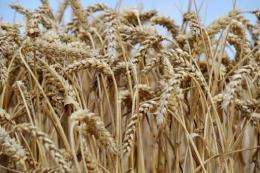Decoding of wheat genome will aid global food shortage

Wheat production world-wide is under threat from climate change and an increase in demand from a growing human population. Liverpool scientists, in collaboration with the University of Bristol and the John Innes Centre, have sequenced the entire wheat genome and will make the DNA data available to crop breeders to help them select key agricultural traits for breeding.
Bread wheat, with an estimated world harvest of more than 550 million tonnes, is one of the most important food crops in the world and is worth more than £2 billion to the UK's agricultural industry. Wheat breeders, however, have few genetic tools to help them select key agricultural traits for breeding and do not always know the genes responsible for the trait they need. Scientists have analysed the wheat genome, which is five times larger than the human genome, to give breeders the tools required to select traits for a healthy yield.
Professor Neil Hall, from the Institute of Integrative Biology, explains: "Sequencing the human genome took 15 years to complete, but with huge advances in DNA technology, the wheat genome took only a year. The information we have collected will be invaluable in tackling the problem of global food shortage. We are now working to analyse the sequence to highlight natural genetic variation between wheat types, which will help significantly speed up current breeding programmes."
The project, funded by the Biotechnology and Biological Sciences Research Council (BBSRC), was undertaken at the University's Centre for Genomic Research. The facility is home to five next generation genome analysers, which can read DNA hundreds of times faster than the systems that were used to sequence the human genome.
Dr Anthony Hall added: "Wheat production is already under pressure with failures in the Russian harvest driving up world wheat prices. It is predicted that within the next 40 years world food production will need to be increased by 50 per cent. Developing new, low input, high yielding varieties of wheat, will be fundamental to meeting these goals. Using this new DNA data we will identify variation in gene networks involved in important agricultural traits such as disease resistance, drought tolerance and yield."
Professor Keith Edwards, from the University of Bristol, said: "In a short space of time we have delivered most of the sequences necessary for plant breeders to identify genetic differences in wheat. The public release of the data will dramatically increase the efficiency of breeding new crop varieties."
Provided by University of Liverpool

















